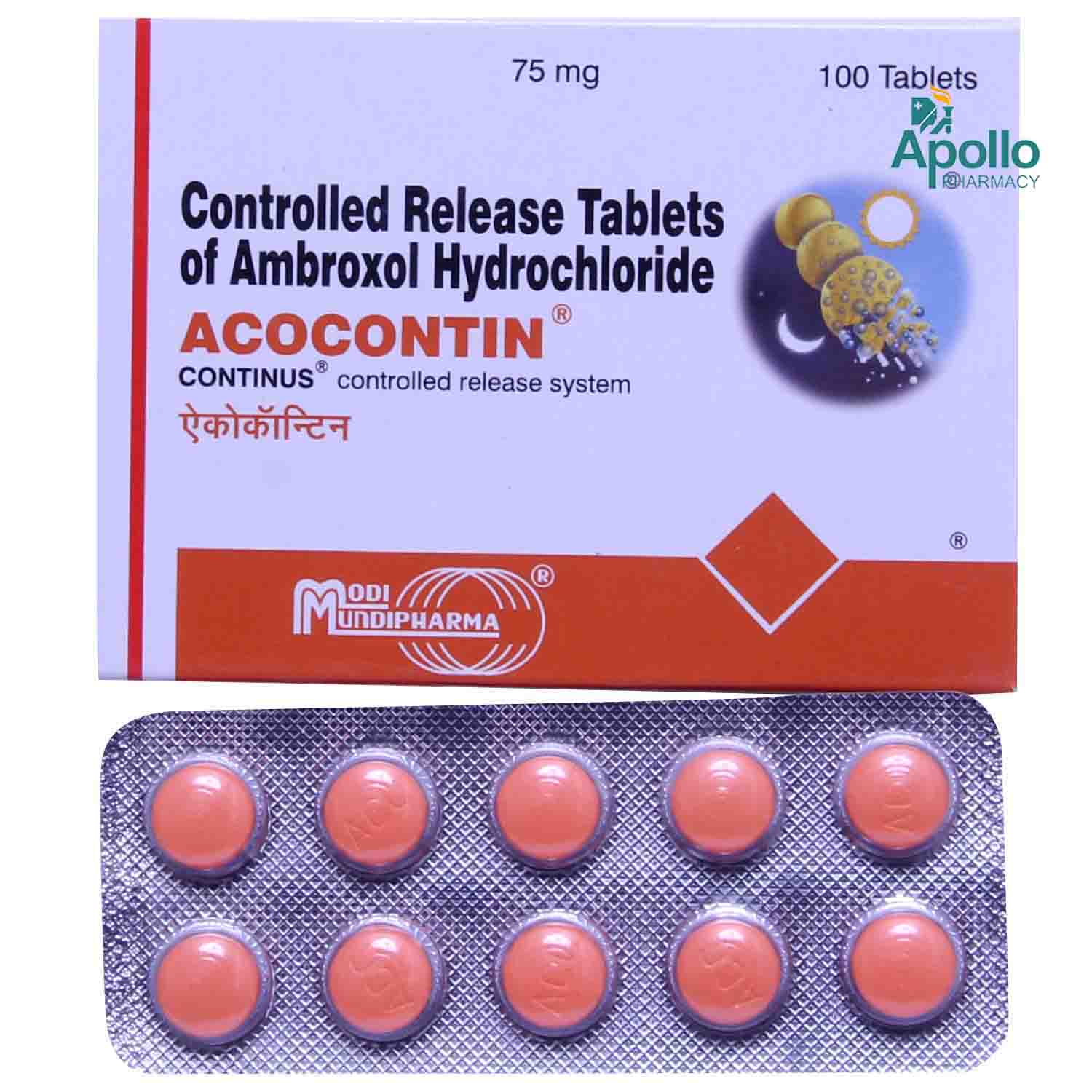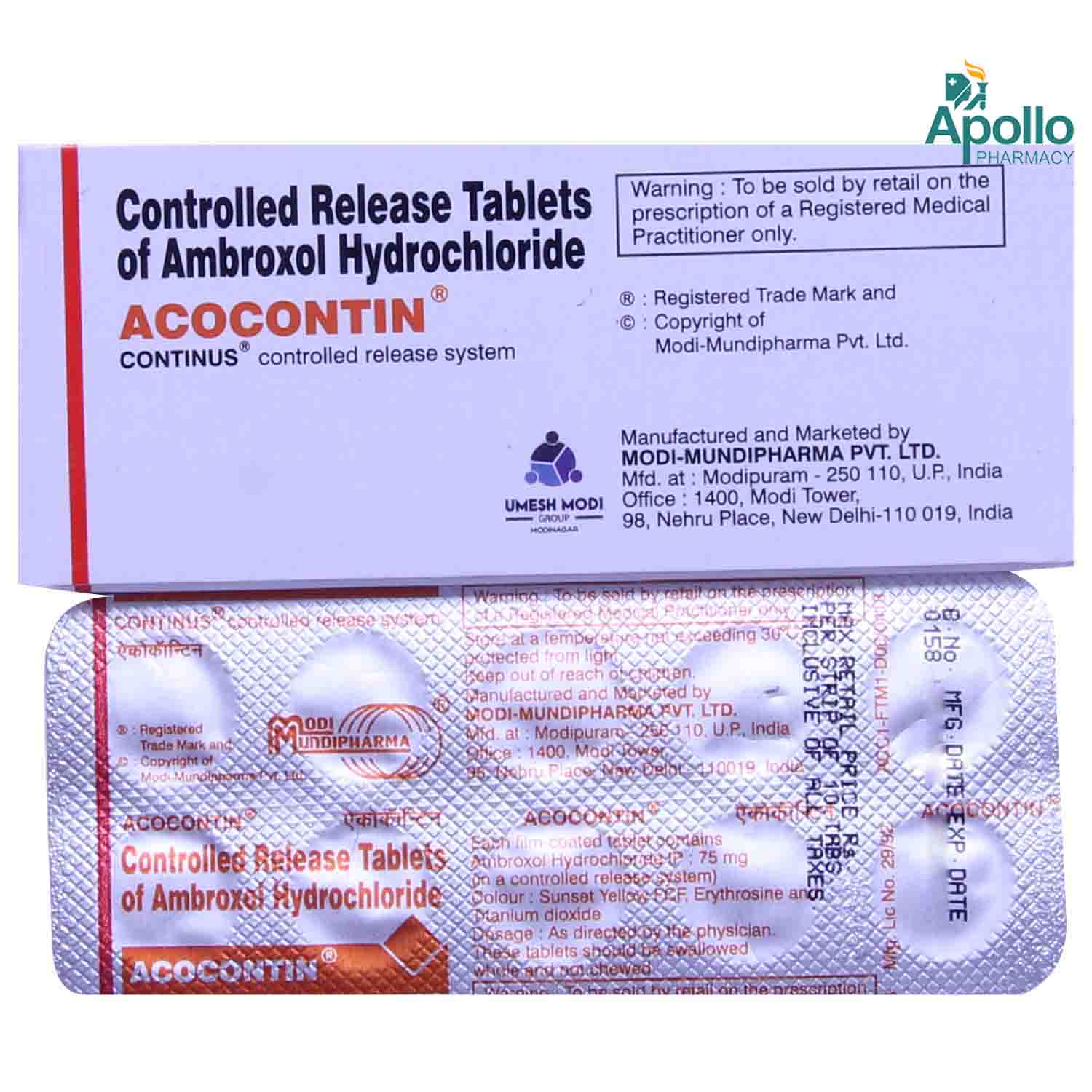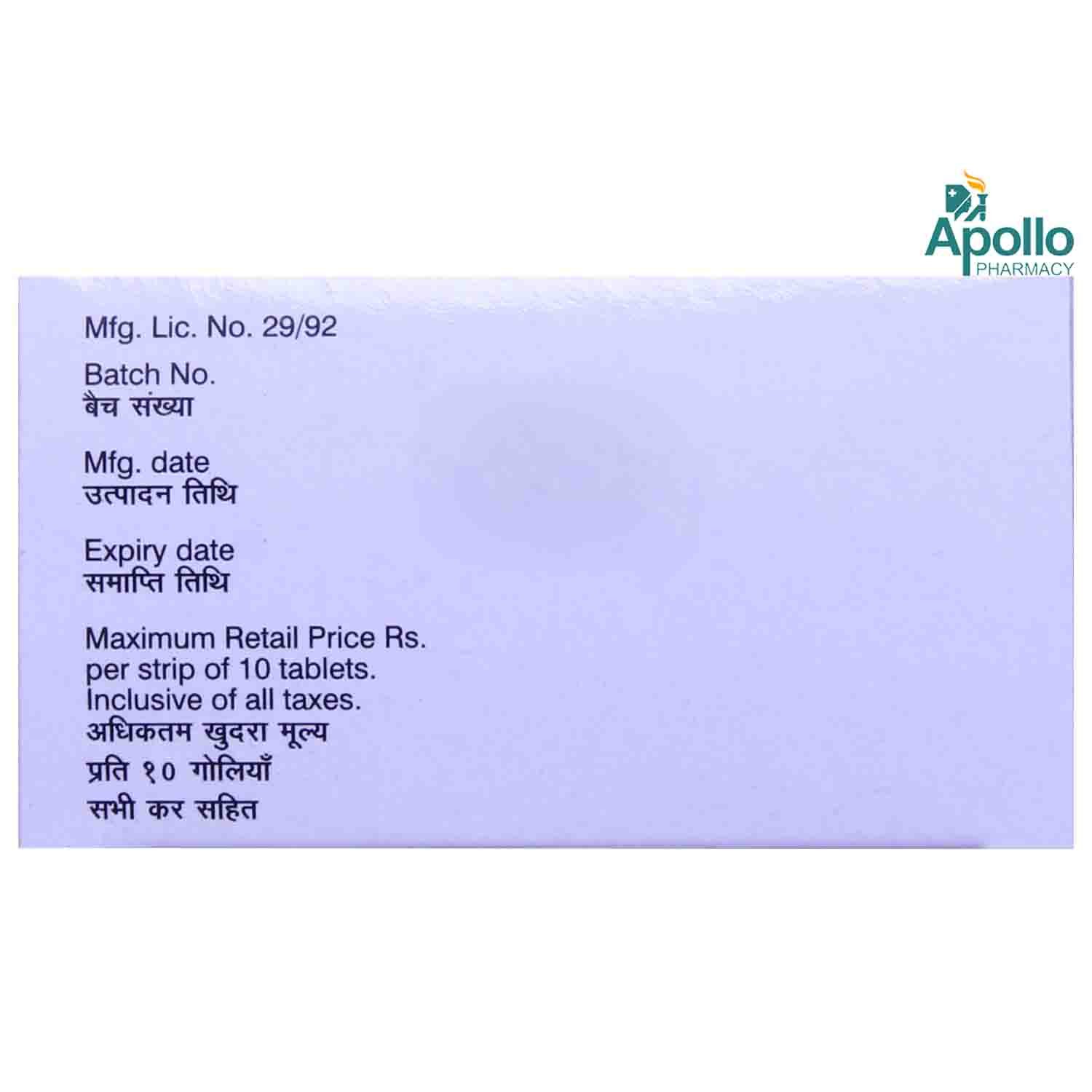Acocontin Tablet 10's






MRP ₹265.5
(Inclusive of all Taxes)
₹39.8 Cashback (15%)
Provide Delivery Location
Online payment accepted
 Prescription drug
Prescription drugWhats That
Composition :
Manufacturer/Marketer :
Consume Type :
Return Policy :
Expires on or after :
About Acocontin Tablet
Acocontin Tablet belongs to a class of drugs called 'mucolytic agents' (cough/sputum thinner) primarily used to treat acute (short term) and chronic (long term) respiratory diseases associated with excess mucus. Acute respiratory diseases are initially associated with dry, irritating cough, hoarseness in laryngitis (swelling of the voice box) or burning sensation in chest due to bronchitis (swelling of the lining of bronchial tubes). Then, wet mucus forms and continuous coughing out of sputum occurs. In chronic respiratory diseases, both dry irritating cough and wet cough with mucus occur.
Acocontin Tablet contains Ambroxol that works by thinning and loosening phlegm (mucus) in lungs, windpipe and nose. Acocontin Tablet breakdown the acid mucopolysaccharide fibres that make the mucous (sputum) thinner and less dense/viscous removing sputum efficiently by coughing. However, the viscosity of sputum remains low for as long as treatment is maintained.
Take Acocontin Tablet as prescribed. Your doctor will recommend how often you take Acocontin Tablet based on your medical condition. Some people may experience nausea, taste change, numbness in mouth, tongue and throat. Most of these side effects of Acocontin Tablet do not require medical attention and gradually resolve over time. However, if the side effects persist or worsen, please consult your doctor.
If you are known to be allergic to Acocontin Tablet or any other medicines, please tell your doctor. If you are pregnant or breastfeeding, it is advised to inform your doctor before using Acocontin Tablet . If you have kidney or liver problems, stomach ulcer, asthma or cough from long time, please inform your doctor before taking Acocontin Tablet . In children below 6 years, liquid form is preferred as tablets are contraindicated.
Uses of Acocontin Tablet
Directions for Use
Medicinal Benefits
Acocontin Tablet is a mucolytic agent (mucus thinner) that is used to treat acute (short term) and chronic (long term) respiratory diseases associated with excess mucus. Acocontin Tablet helps in making cough less viscous so that it can be coughed out easily in the conditions of acute and recurrent bronchitis (airways infection), laryngitis (voice box infection), and tracheitis (windpipe infection) and chronic diseases like chronic bronchitis and chronic obstructive pulmonary disease (COPD). Thus, helps in thinning and loosening phlegm (mucus) in the lungs, windpipe, and nose to cough out easily and provide relief from symptoms such as wheezing, coughing, tightness in the chest and shortness of breath.
Storage
- Drink water or other clear fluids.
- To prevent worsening of pain, limit intake of tea, coffee, or alcohol.
- Include bland foods like rice, toast, crackers, and rice in your diet.
- Avoid lying down immediately after eating as it may cause indigestion or heartburn.
- Avoid acidic and spicy food as it may cause indigestion.
Drug Warnings
Talk to your doctor before taking Acocontin Tablet if you have had a cough for a long time, asthma or suffer from serious asthma attacks, liver or kidney problems, or peptic or duodenal ulcers. There have been reports of severe skin allergic reactions with Acocontin Tablet , so if you develop a skin rash, immediately stop using Acocontin Tablet and contact your doctor immediately.
Drug-Drug Interactions
Drug-Drug Interactions
Login/Sign Up
Drug-Food Interactions
Drug-Food Interactions
Login/Sign Up
Diet & Lifestyle Advise
- Avoid dairy products such as milk as it may increase mucus production. Also, avoid processed or refined foods to have relief from cough. Instead replace baked foods, fried foods, white bread, white pasta, French fries, sugary deserts and chips with green leafy vegetables.
- Drink plenty of fluids to avoid dry throat while you have cough.
- Avoid citrus fruits as it may worsen cough. Eat fruits that are rich in water content such as pears, watermelon, peaches and pineapples.
Side Effects of Acocontin Tablet
- Nausea
- Taste change
- Numbness in mouth, tongue and throat
Habit Forming
Therapeutic Class
Acocontin Tablet Substitute

Product Substitutes
Author Details
We provide you with authentic, trustworthy and relevant information
Drug-Diseases Interactions
Drug-Diseases Interactions
Login/Sign Up
FAQs
No, Acocontin Tablet is not recommended for use during pregnancy especially in the first three months as it may harm the developing baby. Therefore, if you are pregnant or planning for pregnancy, please inform your doctor before taking Acocontin Tablet .
You are recommended to take Acocontin Tablet for as long as your doctor has prescribed it. However, if the symptoms worsen or persist after 5 days (3 days in children) of using Acocontin Tablet , please consult your doctor.
Yes, Acocontin Tablet may cause severe skin reactions in some people. It is not necessary for everyone taking Acocontin Tablet to have skin reactions. However, if you notice a skin rash including lesions of nose, throat, mouth, genitals or eyes, stop taking Acocontin Tablet and consult a doctor immediately.
Yes, you may take Acocontin Tablet with antibiotics such as erythromycin, amoxicillin, doxycycline and cefuroxime as it may increase the concentration of antibiotics in the formed mucus in airways. However, you are recommended to consult a doctor before using Acocontin Tablet with antibiotics or any other medicines.
No, you are not recommended to stop taking Acocontin Tablet without consulting your doctor as it may worsen cough or cause recurring symptoms. Therefore, take Acocontin Tablet for as long as your doctor has prescribed it and if you experience any difficulty while taking Acocontin Tablet , please consult your doctor.
Drug-Drug Interactions Checker List
- CODEINE
- AMOXICILLIN
- CEFUROXIME
- ERYTHROMYCIN
Special Advise
- If you are allergic to some sugars, please inform your doctor as Acocontin Tablet may contain sorbitol.
- You are recommended not to take Acocontin Tablet for more than 10 days without your doctor’s advice.
Disease/Condition Glossary
Cough: Acute respiratory diseases are initially associated with dry, irritating cough, hoarseness in laryngitis (swelling of the voice box), or burning sensation in the chest due to bronchitis (swelling of the lining of bronchial tubes). Then, wet mucus forms, and continuous coughing out of sputum occurs. In chronic respiratory diseases such as chronic obstructive pulmonary disease and chronic bronchitis, both dry irritating cough and wet cough with mucus occur.

Have a query?
Buy best Respiratory System products by
Cipla Ltd
Lupin Ltd
Glenmark Pharmaceuticals Ltd
Sun Pharmaceutical Industries Ltd
Alkem Laboratories Ltd
Macleods Pharmaceuticals Ltd
Mankind Pharma Pvt Ltd
Zydus Healthcare Ltd
Leeford Healthcare Ltd
Dr Reddy's Laboratories Ltd
Zydus Cadila
Abbott India Ltd
Intas Pharmaceuticals Ltd
Alembic Pharmaceuticals Ltd
German Remedies Ltd
Centaur Pharmaceuticals Pvt Ltd
Ipca Laboratories Ltd
Aristo Pharmaceuticals Pvt Ltd
Pristine Pearl Pharma Pvt Ltd
Wockhardt Ltd
GlaxoSmithKline Pharmaceuticals Ltd
Zuventus Healthcare Ltd
Koye Pharmaceuticals Pvt Ltd
Micro Labs Ltd
Blue Cross Laboratories Pvt Ltd
Medishri Healthcare Pvt Ltd
Med Manor Organics Pvt Ltd
Indiabulls Pharmaceuticals Pvt Ltd
Adonis Laboratories Pvt Ltd
FDC Ltd
Fourrts India Laboratories Pvt Ltd
Tablets India Ltd
J B Chemicals & Pharmaceuticals Ltd
Shreya Life Sciences Pvt Ltd
Divine Savior Pvt Ltd
Indoco Remedies Ltd
Seagull Pharmaceutical Pvt Ltd
Yash Pharma Laboratories Pvt Ltd
Torque Pharmaceuticals Pvt Ltd
Uniza Healthcare Llp
Wings Pharmacuticals Pvt Ltd
Biological E Ltd
Corona Remedies Pvt Ltd
Icarus Health Care Pvt Ltd
Steris Healthcare
Apex Laboratories Pvt Ltd
Geno Pharmaceuticals Pvt Ltd
Navil Laboratories Pvt Ltd
Precept Pharma
Aar Ess Remedies Pvt Ltd
La Renon Healthcare Pvt Ltd
Torrent Pharmaceuticals Ltd
Astra Zeneca Pharma India Ltd
Biochem Pharmaceutical Industries Ltd
Comed Chemicals Ltd
Entod Pharmaceuticals Ltd
Franco Indian Pharmaceuticals Pvt Ltd
Healthgate Pvt Ltd
Intra Life Pvt Ltd
Megma Healthcare Pvt Ltd
Pfizer Ltd
RPG Life Sciences Ltd
Unipark Biotech Pvt Ltd
Votary Laboratories (India) Ltd
Wanbury Ltd
Brinton Pharmaceuticals Ltd
Dolvis Bio Pharma Pvt Ltd
Eisen Pharmaceutical Co Pvt Ltd
Group Pharmaceuticals Ltd
Knoll Pharmaceuticals Ltd
Morepen Laboratories Ltd
Panacea Biotec Ltd
Prevego Healthcare & Research Pvt Ltd
Rnd Laboratories Pvt Ltd
Sanatra Healthcare Ltd
Skn Organics Pvt Ltd
Stedman Pharmaceuticals Pvt Ltd
Thuyam Life Pvt Ltd
Timon Pharmaceuticals Pvt Ltd
Aglowmed Pharmaceuticals Ltd
Ajanta Pharma Ltd
Alniche Life Sciences Pvt Ltd
Bio Warriors Pharmaceucticals Pvt Ltd
Biochemix Health Care Pvt Ltd
Cadila Healthcare Ltd
Cadila Pharmaceuticals Ltd
Caplet India Pvt Ltd
Chemo Healthcare Pvt Ltd
Delcure Life Sciences Ltd
East West Pharma India Pvt Ltd
Elder Pharmaceuticals Ltd
Embiotic Laboratories (P) Ltd
Emcee Pharmaceuticals (P) Ltd
Foregen Healthcare Ltd
Hetero Healthcare Pvt Ltd
Incite Pharmaceuticals
Iva Healthcare Pvt Ltd
Kepler Healthcare Pvt Ltd
Kristal Pharmaceuticals
Lincoln Pharmaceuticals Ltd
Alcohol
Caution
Interaction of alcohol with Acocontin Tablet is unknown. Please consult a doctor before consuming alcohol with Acocontin Tablet .
Pregnancy
Unsafe
Acocontin Tablet is a Category C pregnancy drug and is not recommended for pregnant women especially in the first 3 months as it may cause harm to the unborn baby.
Breast Feeding
Unsafe
Avoid breastfeeding while taking Acocontin Tablet as it may be excreted in breast milk and cause adverse effects in the baby.
Driving
Safe if prescribed
Acocontin Tablet usually does not affect your ability to drive or operate machinery.
Liver
Caution
Take Acocontin Tablet with caution, especially if you have a history of Liver diseases/conditions. The dose may be adjusted by your doctor as required.
Kidney
Caution
Take Acocontin Tablet with caution, especially if you have a history of Kidney diseases/conditions. The dose may be adjusted by your doctor as required.
Children
Caution
Acocontin Tablet in tablet is not recommended for children below 6 years of age. Acocontin Tablet in oral solution form is given for children below 6 years in doses prescribed by a doctor.






